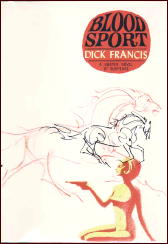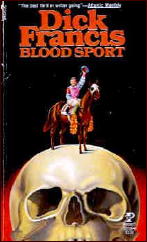Mon 15 Feb 2010
A 1001 MIDNIGHTS review: DICK FRANCIS – Blood Sport.
Posted by Steve under 1001 Midnights , Obituaries / Deaths Noted , Reviews[4] Comments
by Thomas Baird:
DICK FRANCIS – Blood Sport. Harper & Row, hardcover, 1968. Michael Joseph, UK, hc, 1967. Reprinted many times in both hardcover and soft.

From the winning world of British steeplechasing (where he was Champion Jockey in 1954), Dick Francis moved effortlessly into crime fiction with his first novel, Dead Cert, in 1962, and continues to be a front-runner.
He has written twenty-some excellent thrillers full of old-fashioned moral polarity with strains of humor. These “adventure stories” (as Francis calls them) have amazing plots of clever evilness and feature nonrecurring heroes familiar with the racing game.
Flawed, uninvolved, and soulless, each central character finds the value of vulnerability and returns to the land of the living through courage and love. As a central theme, it can be compared to that of the works of Ross Macdonald. As critic John Leonard said, “Not to read Dick Francis because you don’t like horses is like not reading Dostoevski because you don’t like God.”

In Blood Sport, death lurks on a simple Sunday sail on the Thames. An American visitor is almost drowned, and his rescuer is convinced that it wasn’t simply an accident.
Gene Hawkins, the rescuer and hero, is an English civil servant, a “screener” who checks employees in secret-sensitive government jobs. His training permits him to spot details that make “accidents” phony, and his knowledge of guns and listening devices comes in handy. The rescued man asks for help in locating a stolen horse that has just been bought for a huge price.
Hawkins is relieved to use his vacation time to hunt for missing horses, because he is despondent, filled with a “fat black slug of depression.” This is the only part of his character that doesn’t ring true-after all, it’s only a failed love affair.

The pace picks up, and the scene changes to the U.S.A. From the farms of Kentucky, the trail is followed to Jackson, Wyoming. Along the way, Hawkins gets people together for some psychological reconditioning and exposes a bloodline scam as the scene shifts to Santa Barbara, Las Vegas, and Kingman, Arizona.
The U.S. tour is fast-moving, and Francis does not dwell on local-color background, especially not to make any points. He just gives the graphic, journalistic details of a place that push the story along
———
Reprinted with permission from 1001 Midnights, edited by Bill Pronzini & Marcia Muller and published by The Battered Silicon Dispatch Box, 2007. Copyright © 1986, 2007 by the Pronzini-Muller Family Trust.
DICK FRANCIS, R. I. P. (1920-2010). Another giant has left us. Dick Francis died on Sunday at the age of 89. A long obituary appears online here at the Daily Mail website, but it is just one of many, not including dozens and dozens of tributes to be found on mystery-oriented blogs.
Francis was the author of 42 thriller novels, all of them having horse racing as a major part of the story. In 2000 Queen Elizabeth II honored Francis by making him a Commander of the British Empire. During his long career he won three Edgar Allen Poe awards given by the Mystery Writers of America for his novels Forfeit (1968), Whip Hand (1979) and Come to Grief (1995).
He also was awarded a Cartier Diamond Dagger from the Crime Writers’ Association for his contributions to the field, and they made him a Grand Master in 1996 for a lifetime’s achievement.
After a lengthy hiatus following the death of his wife, Francis recently began writing again, working with his son Felix to produce Dead Heat (2007), Silks (2008) and Even Money (2009). A new novel entitled Crossfire will be published this year.
Editorial Comment: As I continue this tribute to Dick Francis, over the next couple of days I will be posting several more reviews of his work, all also by Thomas Baird and taken from 1001 Midnights. Their titles: Odds Against, The Danger, and Forfeit.
February 15th, 2010 at 5:49 pm
I never met Dick Francis, but after corresponding with him he sent me several signed books. Eventually we broke it off since I knew he suffered terribly from arthritis and felt guilty about his wasting valuable writing time on a fan.
But I’m glad I let him know how much I enjoyed his work.
Whenever I think of Francis I think of a prediction made by Julian Symons in his critical work MORTAL CONSEQUENCES. Francis was already a major writer in the field, but Symons thought he was going to become something more — and not long after his books made the transition to the best seller list as Symons had predicted.
Over the years I’ve met quite a few other Francis fans, a good many of them women, who seemed to respond to his intelligent and vulnerable heroes. Obviously he will be missed, but there are so many good books left behind that I don’t think even his most avid fan has any room to complain.
They may not be all equal, but I can honestly say I never read a bad book by Dick Francis, and never one that wasn’t at the very least a page turner, and the best something more than that.
And you have to admire anyone that managed to work horses into books about everything from banking to movie making and even hurricane hunters.
February 15th, 2010 at 6:10 pm
Yes, you’re absolutely right about the legacy that Dick Francis left us as mystery fans. With over 40 books to his credit, I could easily begin at the beginning, go to the end, and start all over again, and along the way read some of the ones I missed the first time.
And at the time, in the beginning, not being especially fond of mysteries dealing with horses in them, there are several of his earliest ones that I am embarrassed to say that I haven’t yet read.
But I finally caught on. His books are filled with everyday heroes, men (mostly?) who find themselves caught up in something dangerous and nasty, sometimes due to their own failings but more often not.
The background is that of horse racing, but the stories are about how the hero gets himself out of the jam he’s in, finding his inner stuff and fighting back.
I think Dick Francis found out how to channel that kind of bravery and courage and wrote books that almost everyone could identify with.
— Steve
February 15th, 2010 at 6:55 pm
Steve
One thing we both neglected to mention is that Francis managed the neat trick of differentiating his first person narrators enough that none of his protagonists really seem that similar despite their many similarities. In TWICE SHY he even manages the neat trick of splitting the narrative between brothers who he manages to differentiate without seeming to make an effort to do it.
His heroes do tend to be professionals — horse trainers, jockeys, teachers, investigators, artists, even weathermen — and Francis uses that to draw us into their worlds and areas of expertize, but looking back it is surprising how little the pilot in FLYING FINISH, the horse trainer/would be secret agent in FOR KICKS, the sports writer in FORFEIT or any of his other heroes are alike. Their voices are the same, but somehow Francis manages the considerable trick of making each of them an individual without literary gimmicks or tricks. And yet his handful of characters that do appear in more than one book like Sid Halley or Kit Fielding do have distinctive voices.
Many a so called better writer can’t make that claim.
June 17th, 2011 at 6:18 am
My first Dick Francis Novel was 101b penalty that i had bought on impulse. That was way back in year 2008. Since then I have read Driving Force, Under Orders,Forfeit,Bone Crack,Shattered and Banker. Currently am about to finish Blood Sport.
I have two extra books to read on the shelf by the same author: To the Hilt and Wild Horses.
Am owe struck by his life. After serving as a pilot in WW2 he became a Champion Jockey who rode for the Queen Mother. In an interview with his son,Felix reminded his dad about the epitaph of how his grave would be like: ‘here lies the Champion Jockey who never won the Grand National.’ His dad responds on the circumstances that lead to the loss. Describing in detail the race and the crescendo of the enthusiastic fans who had attended the race. He went on to paint a picture of the fall proximity to the end.
Am persuaded the turning point in Francis Life started when he became a racing correspondent. This is probably where his writing skills were honed.
Physically he is not with us. Here in Kenya we celebrate the legacy he left behind. This includes his biological seed that will continue his work- Felix Francis.